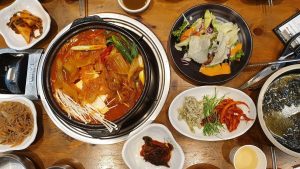In a country renowned worldwide for its barbeque, vegetarian and veganism is on the rise in South Korea. And with more people interested in meat-free options, companies and even the Korean government are taking note.
According to the Korea Vegetarian Union, there are about 1.5 million people in South Korea that follow some sort of plant-based diet, and about 500,000 vegans who do not eat any animal products at all.
It also seems that more Koreans are seeking out information about vegetarianism every year. According to an extensive analysis by The Food and Beverage News, a publication focused on the food industry in South Korea, blog posts on the country’s main portal site, Naver, about vegetarianism leapt from just over 7,000 in 2015 to nearly 30,000 in 2019. In those blogs, the most common reason blog authors cited for cutting down on meat consumption was for health, with 63.1 percent of blogs mentioning healthy cooking, followed by ethical reasons at 52.9 percent, environmental protection concerns at 36.2 percent, and wanting to lose weight at 26.3 percent.
Several high-profile Korean celebrities are vegetarian or vegan, spreading interest and information about these lifestyles to fans and the public. Noted vegetarian Lee Hyori has shown off her meatless lifestyle through her popular reality show, and recently was spotted wearing a vegan leather jacket during an appearance on TV. As Lee’s fashion choice shows, the vegan trend in South Korea is not limited just to food. In a natural leap for the home of K-beauty, the skincare industry is also diving into the vegan trend through lines like Amorepacific’s “Enough Project,” launched this summer.
With all of this growing interest in avoiding meat and other animal products, South Korea’s food industry is taking note. Last summer, Beyond Meat, a U.S.-based plant-based meat company, successfully launched in South Korea, and local grocery chain Lotte Mart soon followed suit, launching its Gogi Daesin (“instead of meat”) line this May. Mirae Asset has also invested in American plant-based company Impossible Foods, injecting $150 million into the brand, famous for its Impossible burgers. Fast food is even jumping on the trend, with Lotte’s Lotteria chain introducing its “Miracle Burger” in February this year.
The trend is not just replacing burgers and sausages, though. Convenience store GS25 is now launching vegan tteokbokki to add to its lineup of instant foods, giving vegetarians and vegans a way to enjoy the popular spicy rice cake snack on the go.
And, in perhaps the biggest shift toward dietary inclusivity on a systemic level, the Korean military will soon start officially giving vegan options to those serving their mandatory military service. The move is meant to help accommodate both vegans and vegetarians as well as those who don’t eat certain types of meat for religious reasons.
There is another government-provided service that may need to think more about dietary restrictions as well — quarantine meals. Animal rights groups have pointed out that the meal boxes provided to people in required self-quarantine after exposure to a COVID-19 case or when arriving in South Korea from abroad are swimming with animal products, at times leaving vegetarians with little to eat other than rice, kimchi, and seaweed. Although concerns over the makeup of quarantine meal boxes are hopefully soon to be behind us, this could be another venue in addition to military meals for the national and local governments to widen their accommodations for people with different dietary needs.

































